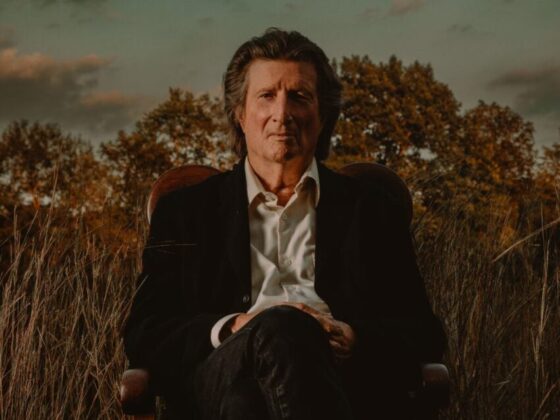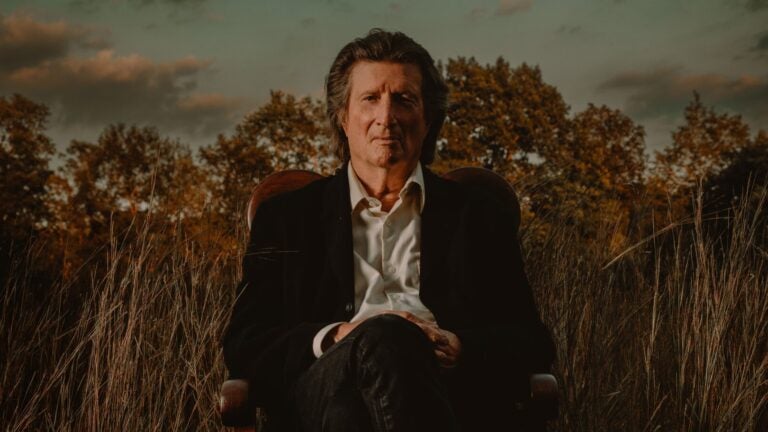No products in the cart.

A nod to Chris: Boston’s folk legend Chris Smither turns 80 this weekend
After hearing the “Word of God” to go to Boston, Chris Smither became a full-on folk legend. He turns 80 this weekend, and will be feted with two shows.

When Bob Dylan turned 60, his musical all-star friends honored him by singing his songs in “A Nod to Bob.”
New England’s all-stars did the same for Chris Smither when he turned 60, with a show at Passim.
This weekend, they’re doing it again for 80 — with twice as many shows.
Call it a Nod to Chris.
In events spearheaded by Peter Mulvey, who calls Smither a “mentor,” a collection of Boston-area folk and blues names — including Vance Gilbert, The Suitcase Junket, and Mark Erelli — play Smither songs at Passim for the sold-out Chris Smither’s 80th Birthday Celebration on Saturday. The gang does it all again on Sunday at the Iron Horse in Northampton. Tickets are still available.
Advertisement:
For the record, Smither and his twin sister were born Nov. 11, 1944, in Miami. He grew up largely in New Orleans, and spent a few years in Paris. He arrived in Boston some 60 years ago, and never left Massachusetts. He’s lived in Amherst for some 15 years.
While Smither doesn’t plan to perform, his friends have so many great cover choices.
Smither has a John Prine-esque sense of wit, and what has long struck me as folksy-yet-piercing Vonnegut-esque insight, in songs like “Origin of Species” or “Leave the Light On.”
Smither songs ponder the existential — time and space, evolution, Homunculus, cavemen simplicity. On his just-released album, “All About the Bones,” the one-time anthropology major writes of bones: “Some will make you stronger/ Others make you tall … It don’t matter/ They all clatter when they end up on the pyres.”
Advertisement:
It’s Smither’s no-bull demeanor and cutting lyrics that strike so many of us.
I’ve interviewed Smither a few times over the years, and he’s always unassuming, soft-spoken, and laughing. You can almost hear that eye-squinting grin over the phone. Sometimes he doesn’t have much to say. The opposite of a self-promoter.
Never even mentioned that he has his own tour coming up — it kicks off next week, and includes a Natick stop Nov. 15 — until I specifically asked.
I called the birthday boy at home to reflect on 80 years, including 60 in the Massachusetts folk scene. In a conversation peppered with his laughter, we talked pre-Columbian excavations, guitars from Spain, Bonnie Raitt, John Prine, and more.
So how did this birthday weekend come about?
I don’t know [laughs]. All I’m doing is turning 80.
[laughs] Peter Mulvey, who considers you a mentor, organized the parties. How did you find out about them?
Peter Mulvey coordinated it with my wife, who manages me. She said, “Chris, they’re gonna do a birthday party for you, like the one when you turned 60” [laughs]. Mulvey organized that one, too. I enjoyed it enormously. All these people got up and sang my songs, and I thought they all sounded great [laughs]. It’s like your kids coming home, and you look at ‘em and say, “God, they turned out OK” [laughs].
Advertisement:
I’m curious whether they’ll sing any songs on the newest record, or if everybody’s gonna concentrate on the back-catalog.
“All About the Bones,” your 20th album, was released earlier this year. Any favorites on that?
Oh, all of them. I go through this every time I make a record. I think to myself, “Oh god! This is the best one we’ve done yet!”
[laughs] Do you think you’d ever want to retire?
No [laughs]. I don’t even talk about it. I’m having the time of my life. Jorma Kaukonen, when people asked him if he was going to retire, he’d say, “So I can do what? Play more guitar?”
[laughs] True. So you grew up mostly in New Orleans, where your dad taught at Tulane. Your uncle taught you the ukulele.
That’s how it all started. I think I was 9. My sister gave me a plastic ukulele; I was so entranced that my mother went in the attic and found her old ukulele, which was nicer — a real wooden one [laughs]. I thought it was a guitar — I wasn’t very big. My uncle said, “Nah, that’s a uke. You wanna learn?” He showed me three chords, and I was off and running.
Advertisement:
You were in Paris shortly after that.
We went to Paris when I was almost 12, and for some reason, didn’t take the ukulele [laughs]. Space was at a premium, I guess. I missed it terribly. My father was a professor in charge of the year-abroad program for Tulane, he had students all over Europe to visit. He came back on my 12th birthday with a guitar from Spain. Said, “Here. Happy birthday.” [laughs] I was in heaven.
I bet.
I still got that guitar. It’s a wreck, but it’s hanging up on the wall here in the house.
You studied anthropology in college, and went on digs.
I went to Mexico City College my first year. I was really interested in pre-Columbian Central America. Then I transferred to Tulane to go on their junior-year abroad program. I went to Paris.
You embarked on a few digs in Mexico City.
I did. Got my feet wet in Oaxaca. But after doing it a couple years I realized I wanted to be a musician. To me, music was just something I did instead of what I was supposed to be doing. I always felt a little bit guilty about it. My father would say, “Quit banging on that thing, and get to work.” He came around in the end, after I started to have some success.
I never finished senior year. I gave up and came to Boston. Never studied music formally — I was encouraged to do it by Eric Von Schmidt in the ‘60s.
Advertisement:
Von Schmidt was the famous Cambridge folk leader, but you met him in Florida, where he wintered.
Right, during my half-hearted senior year, a friend said, “Eric Von Schmidt lives in Sarasota [in the winter] Let’s go look him up.” He was the nicest guy in the world. Asked us in. He listened to me play, and said, “Oh man, you got some stuff. You should get up where people are going to hear you. Come to Boston.” That was like the word of God; I’d been told what to do.
I made a two-month pilgrimage up the East Coast to Boston. I didn’t tell Eric. When I got up there, he was surprised to see me. I said, “Well, you told me to come!” [laughs]
[laughs] Where did you live? How did you start out?
Everybody said go to Club 47 [now Passim] in Harvard Square. That was where it was all happening. I met people who had an extra room in Cambridge; they said, “We could use somebody else on the rent.”
Then one guy said, “Hey, this friend of mine has a gig playing some hotel lounge, and can’t do it anymore. If you want it, it’s $20 bucks a night, two nights a week.” In 1966 that was a lot of money [laughs]. So I did that. The guy who owned the Turk’s Head Coffeehouse heard me at this lounge, and said, “Man, you shouldn’t be playing in here. Nobody’s paying the slightest bit of attention to you. Come on. I’ll put you to work.” That’s where it all started.
Advertisement:
How long did you live in Cambridge?
About 10 years, in various places. Then I bought a house in Arlington. I lived there 30 years. I moved to Western Mass. when I was 65.
In Cambridge, you met Bonnie Raitt. She has that awesome cover of your song, “Love You Like a Man.” She sings, “Love Me like a Man.” How did that come about?
Well, when I met her, she was just a Cliffie [at Radcliffe College.] She wasn’t playing gigs. She was Dick Waterman’s girlfriend. He managed most of the rediscovered blues singers — “Mississippi” Fred McDowell, Son House, Skip James — the original guys.
Wow.
We’d go over Dick’s house to see who was hanging out in his living room because it was always somebody cool. There was this red-headed girl running around: that was Bonnie. I knew her for two years before I even knew she could play guitar.
How did you find that out?
They moved to Philadelphia, and I was playing Philadelphia on weekends. I was still crashing in people’s houses at this point [laughs]. I stayed at Dick’s. She says, “What’ve you been up to?” I said, “Oh, I’ve written a few songs.” I played her “Love You Like a Man.” She went, “Oh, man, that’s so cool. I love it.” I played her another — can’t remember which — she said, “You should play that on slide.” I said, “I don’t know how.” She says, “It’s easy, look.” She picked up this guitar and started wailing. [laughs] That was the first time I’d ever heard her play.
Advertisement:
Did she tell you she was going to cover that song?
No. She was performing very little at that point. All of a sudden, she started to get noticed. Before you knew it, she had a record deal. She called me up one night, like 2 a.m. She’s like, “Chris!” I said, “Oh, hey, Bonnie.” She said, “Chris! We did your song!” I said, “Who’s we?” She said, “Me and my band!” [laughs] I said, “You want me to rewrite it from a female point of view?” She said, “I already did!” [laughs ] I said, “OK, good night. And I went back to sleep.
Did that change things for you?
In the long-run. She was years away from the kind of success she eventually got. Today, I can walk into a bar almost anywhere in the United States where there’s a blues band playing, and if they have a female singer, they’re going to do that song.
That’s true.
[laughs] It’s nuts.
You got your first record deal in 1970. When did you feel like you made it?
Sometimes it seems like it’s only been in the last year. [laughs] I’m not on that level with some of the bigger people I know: Bonnie Raitt, Jackson Browne, Tom Waits. At one time, they were all opening for me. I watched them go, and thought they all deserved the success. I knew I wasn’t at that level. I’m still not. But I’ve reached a solid place.
Advertisement:
I opened for my share of people who helped me, too: Joni Mitchell, Ian & Sylvia. John Prine helped me a lot. He opened up whole cities for me. That’s when I discovered that a John Prine audience was just a Chris Smither audience that hadn’t heard me yet.
[laughs] That’s very true. I think of you two as being so similar in so many ways.
I tried to thank him once because he’d give me long opening slots. He stopped me, and said, “Chris, I don’t do it for you, I do it for me.” [laughs] Nice guy.
I love that. And how do you know Peter Mulvey?
He opened for me a long time ago at the Old Vienna Kaffeehaus. They loved him. I said, I should pay attention to this kid. We’ve been friends since.
On the Passim site, he calls you “a mentor.”
Yeah, that’s how he looks at it. I mean, a bunch of these guys and gals that are going to play my birthday party sort of look at me that way, but to me, they’re just people who deserve to be heard.
That’s very similar to Prine’s sentiment. So Von Schmidt told you to come here 60 years ago. But what’s kept you in Massachusetts?
Oh, I like it here. Full of smart people. It’s halfway between San Francisco and Paris. It’s got everything.
Lauren Daley is a freelance writer. She can be reached at [email protected]. She tweets @laurendaley1, and Instagrams at @laurendaley1. Read more stories on Facebook here.
Boston.com Today
Sign up to receive the latest headlines in your inbox each morning.




